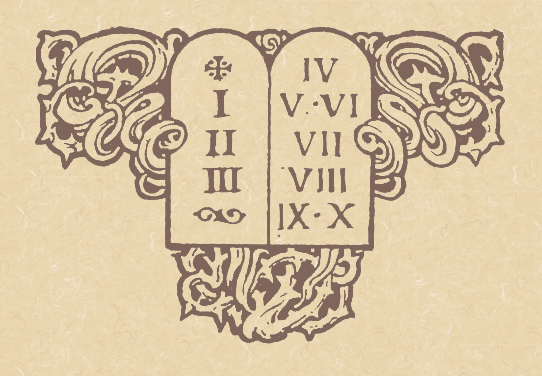The Only Reason We Are Here.
The Memorial of Saint Anthony of Padua.
Lessons from the primary feria (the Tenth Thursday of Ordinary Time), according to the ordinary form of the Roman Rite:
• II Corinthians 3: 15—4: 1, 3-6.
• Psalm 85: 9-14.
• Matthew 5: 20-26.
|
… or, from the proper:
• Isaiah 61: 1-3.
• Psalm 89: 2-5, 21-22, 25, 27.
• Luke 10: 1-9.
… or, any lessons from the common of Pastors for One Pastor, or the common of Doctors of the Church, or the common of Holy Men & Women for Religious.
|
Petecost Thursday.
Lessons from the Octave feria, according to the extraordinary form of the Roman Rite:
• Acts 8: 5-8.
• [The Gradual is omitted.]
• [Sequence] Veni, Sancte Spiritus…*
• Luke 9: 1-6.
FatherVenditti.com
|
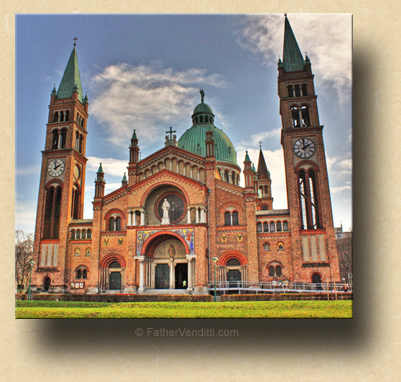 5:59 AM 6/13/2019 — Many years ago—I believe I had been a priest for three or four years at that time—I had been approached by a small community of religious sisters and asked if I would serve as retreat master for a group of college girls who were thinking about joining the community; but, the retreat they were asking me to preach would not be held in any one house of their community, but would, in fact, be a moving retreat: it would take place over the course of a whole month, during which I was to take these girls to various convents of the community throughout Italy and France. 5:59 AM 6/13/2019 — Many years ago—I believe I had been a priest for three or four years at that time—I had been approached by a small community of religious sisters and asked if I would serve as retreat master for a group of college girls who were thinking about joining the community; but, the retreat they were asking me to preach would not be held in any one house of their community, but would, in fact, be a moving retreat: it would take place over the course of a whole month, during which I was to take these girls to various convents of the community throughout Italy and France.
Despite being both small and new, this little group of nuns had a patron in Rome, a Cardinal who had taken them under his wing, and who had arranged for them to be given a number of beautiful convents previously owned by other religious orders but now abandoned. So, this little community of sisters, no more than ten years old, and having no more than thirty or forty members at the time, had possession of some of the most historical convents in Europe in the most auspicious locations. We spent two nights in what was once an old Dominican convent, the top floor of which looked down into the gardens of Castel Gandolfo, the pope's summer residence; we spent one night and a day in an old Salesian convent on the grounds of the Catacombs of Saint Callixtus just outside Rome, with access to the very chamber in which Pope Saint Sixtus II met his death and is now buried;—I offered Holy Mass on his tomb—we spent a few days in Milan, where I learned to offer the Holy Sacrifice according to the Ambrosian Rite, in the crypt of the very place where Saint Ambrose and his two deacons are entombed; we stayed in convents in Lourdes and Grenoble, in Assisi and in Rome itself. 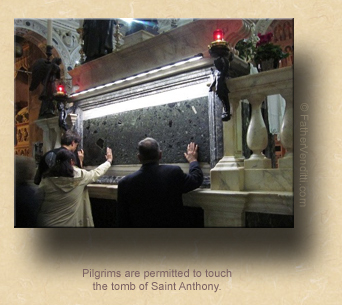 But, by far, one of the most beautiful places these nuns had a house we stayed in, was in north eastern Italy, on the shores of the Adriatic, in the city of Padua, the city of Saint Anthony. But, by far, one of the most beautiful places these nuns had a house we stayed in, was in north eastern Italy, on the shores of the Adriatic, in the city of Padua, the city of Saint Anthony.
The Basilica of Saint Anthony, where the saint's remains are entombed, is one of the most beautiful and moving places in all the Catholic world. Not only is the church magnificent architecturally, built in a kind of hybrid of Arabic, Romanesque and Byzantine styles, but also very moving spiritually. It's one of the few great pilgrimage destinations left in Europe where the tourism can't compete with the profound faith of those who come to pray to the patron saint of those who are lost. A lot of us make the mistake of thinking that Saint Anthony is the saint you pray to when you've lost your car keys; but, he's not the saint of lost things, but of lost people. And I don't mean by that people who are missing, but people whose life has no direction, who don't know where they're going or even where they are.
Today, the thirteenth of June, is also the anniversary of the second apparition of Our Lady of Fatima, and it was not a coincidence that our Blessed Mother appeared to the three children on Saint Anthony’s feast. Although he died in Padua in 1231 and is buried there, Saint Anthony was born in Lisbon in 1195; in fact, in many places throughout Europe, he's not known as Saint Anthony of Padua, but Saint Anthony of Lisbon. 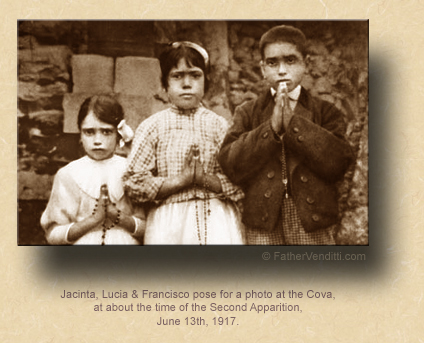 When Pope Saint John Paul II visited Fatima, Portugal, he told the crowd there that Saint Anthony was not Saint Anthony of Padua, at which they all cheered deliriously; then he told them that he wasn't Saint Anthony of Lisbon either, and was met by stunned silence. But their silence turned to cheers again when he told them that the saint's true title should be “Saint Anthony of the Whole World.” When Pope Saint John Paul II visited Fatima, Portugal, he told the crowd there that Saint Anthony was not Saint Anthony of Padua, at which they all cheered deliriously; then he told them that he wasn't Saint Anthony of Lisbon either, and was met by stunned silence. But their silence turned to cheers again when he told them that the saint's true title should be “Saint Anthony of the Whole World.”
Lucia, the oldest and last surviving of the Fatima children, was born and raised in a parish named after Saint Anthony. So, June 13th was a special day in Fatima long before Lucia was born: not only was it the feast of the Patron Saint of Portugal, it was also the patronal feast of the local parish, which is why so many people were able to be present with the children to witness to the apparition, since all the shops and businesses were closed for the feast.
If you ever have the inkling to make a pilgrimage to some holy sites in Europe, don’t just go to the famous one’s like Lourdes and Fatima. For me, the most moving were La Salette, site of the first ever apparition of the Mother of God; Paray-le-Monial, where Saint Margaret Mary received her visions of the Sacred Heart; and Padua, the city of Saint Anthony, where so many people have rediscovered their faith after having been lost.
As to today’s Scripture lessons ….
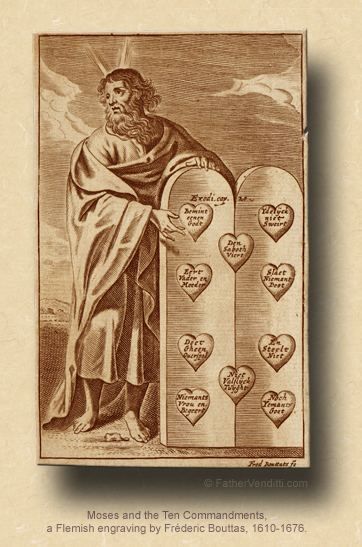 Yesterday, we heard Our Blessed Lord tell us that He has not come to abolish the law and the prophets, but to fulfill them; and, today He continues this same thought by reminding his disciples that their faith must surpass that of the scribes and Pharisees. These Jewish leaders were very good at sticking to the rules, but had forgotten what it was all for. Yesterday, we heard Our Blessed Lord tell us that He has not come to abolish the law and the prophets, but to fulfill them; and, today He continues this same thought by reminding his disciples that their faith must surpass that of the scribes and Pharisees. These Jewish leaders were very good at sticking to the rules, but had forgotten what it was all for.
In our first lesson, the Blessed Apostle Paul expands on Our Lord’s instruction by reminding us that we, too, can fall into the same trap as the Pharisees when we obsess over rules and regulations without keeping the big picture clearly in mind. For him, adherence to the rules is essential, just as it is for Our Lord, but becomes meaningless if not done for the right reason, which he expresses by describing how the children of Israel read the law of Moses as if it were covered with a veil, and that veil is only removed when one reads the law in the light of Christ who fulfills it. The point that both Our Lord and His greatest Apostle are making is that everything we do in our religious lives—in the Church, in the social arena, in the confines of our own personal interior lives and spiritual practices—is for the purpose of ensuring our own salvation.
Our Lord ends His instruction to us today with a peculiar analogy about settling with your opponent before you get to the court house. He’s not giving legal advice. He’s pointing out that all of us are continually traveling the road to that leads to our Final Judgment, and the “opponent” of which He speaks are all those worries and concerns and resentments and passions that tempt us off the straight and narrow road. Our one purpose for being on this earth is to work out our salvation. Everything else is just window-dressing. The words are easy to say, not so easy to appreciate when we feel burdened by so many worldly concerns, but Saint Augustine said it much better: “Thou hast made us for Thyself, O Lord, and our hearts are restless until they rest in Thee” (Confessions, I, 1).

* Come, Holy Ghost, send down those beams,
which sweetly flow in silent streams
from Thy bright throne above.
O come, Thou Father of the poor;
O come, Thou source of all our store,
come, fill our hearts with love.
O Thou, of comforters the best,
O Thou, the soul's delightful guest,
the pilgrim's sweet relief.
Rest art Thou in our toil, most sweet
refreshment in the noonday heat;
and solace in our grief.
O blessed Light of life Thou art;
fill with Thy light the inmost heart
of those who hope in Thee.
Without Thy Godhead nothing can,
have any price or worth in man,
nothing can harmless be.
Lord, wash our sinful stains away,
refresh from heaven our barren clay,
our wounds and bruises heal.
To Thy sweet yoke our stiff necks bow,
warm with Thy fire our hearts of snow,
our wandering feet recall.
Grant to Thy faithful, dearest Lord,
whose only hope is Thy sure word,
the sevenfold gifts of grace.
Grant us in life Thy grace that we,
in peace may die and ever be,
in joy before Thy face. Amen. Alleluia.
|
